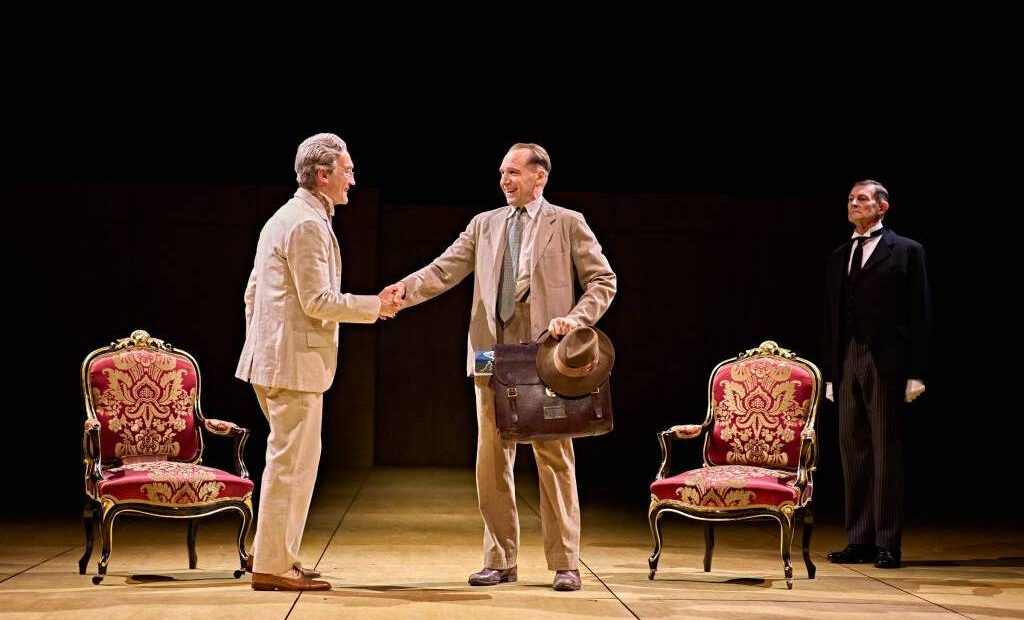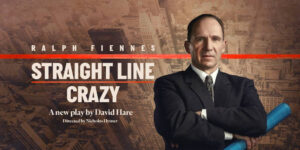Straight Line Crazy at Bridge Theatre

Robert Moses changed 1920s New York forever with his innovative infrastructure and pioneering approach to urban planning. Forever championing the automobile, even though he himself never learned to drive, Moses designed vast expressways to connect various boroughs of New York, as well as an underwater tunnel and several bridges. He transformed barren land into public parks, winning the support and respect of both the people and the politicians in the process. Evidently ahead of his time, Moses achieved an unprecedented amount of power within government circles, thanks in part to his close friendship with governor Al Smith. But the visionary idealist was not without his controversies: displacing thousands of residents from their homes without so much as batting an eyelid, Moses presented a ruthless edge and controlling core. Claims of racism came when he was accused of making a bridge too low for buses, so minority ethnic groups could not reach certain parts of the city. By the 1950s people were growing ever increasingly concerned over the seemingly unstoppable planner’s power over the city and the vast changes he was determined to implement. The once esteemed social figure’s light at last began to dim.
The story is not an obvious one to take to the stage, but writer David Hare has clearly invested a tremendous amount of time and energy into researching his subject. The result, though, is an incredibly wordy, overlong and overwritten passion project that fails to ignite enough interest to make this the captivating piece of theatre one expects it to be. The seating configuration immediately invites the audience into the action, but, unfortunately, there just isn’t enough of it. Thankfully, the production is salvaged by some remarkable performances.
Ralph Fiennes is the obvious draw, and it is no exaggeration to say the actor delivers a powerhouse performance. From his slumped stance and somewhat hurried, slightly dishevelled appearance to his animated movements and facial expressions, Fiennes offers masterful physicality while mining as much humour as possible out of the character. He is complemented impeccably by Siobhán Cullen as loyal employee Finnuala. Samuel Barnett provides sturdy support in her colleague Ariel, and Helen Schlesinger is engrossing as real-life journalist and critic of Moses, Jane Jacobs.
As the unrelenting dialogue and exposition dominates the opening act and audiences crave an injection of energy, it finally comes in the form of Danny Webb’s Al Smith. The scene-stealing actor is a delight, successfully embodying the larger-than-life, bourbon-guzzling governor without straying too close to stereotype.
While the first act presents a scattering of laughs and outstanding acting, audience attention begins to wane during the second half, which is in dire need of an edit. Webb is noticeably absent and there is no one else to fill his energetic shoes. The humour also dries up and spectators are left simply yearning for more visual action and engagement. References to Moses’ alcoholic wife promise a potential new direction but as we never see her or the main character outside of work, it ultimately ends up feeling like a hollow attempt at making him more human.
This is a very minimal production on an expansive stage with a prodigious team behind it. Much like his protagonist, Hare adheres to straight lines in his storytelling, meandering off on the odd tangent but predominantly providing us with information overload. It’s a shame that a story with such a huge personality at its heart has been executed in the most pedestrian of ways, when there is clearly a blueprint for something far more memorable and invigorating.
Jonathan Marshall
Photo: Manuel Harlan
Straight Line Crazy is at Bridge Theatre from 14th March until 18th June 2022. For further information or to book visit the theatre’s website here.


























Facebook
Twitter
Instagram
YouTube
RSS